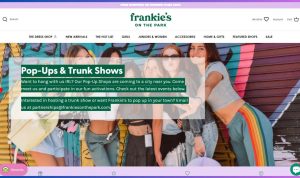Partnering with Influencers in the Tech Niche is an exciting strategy that can significantly amplify your brand’s reach and credibility. As the tech landscape evolves, so does the importance of aligning with influential voices who can authentically connect with your target audience. These partnerships not only help in showcasing innovative products but also in building trust within a community that’s always on the lookout for reliable recommendations.
By leveraging the power of influencers, brands can tap into new demographics, enhance their visibility, and foster engaging conversations around their offerings. With the right influencer partnerships, companies in the tech niche can navigate the complexities of digital marketing while ensuring they resonate with the ever-changing needs and preferences of consumers.
In recent years, the significance of online presence has surged, with businesses across various sectors recognizing the imperative to establish and maintain a robust digital footprint. The digital landscape is continually evolving, influenced by advancements in technology, shifts in consumer behavior, and the emergence of new marketing strategies. This article delves into the multifaceted aspects of building an online presence, highlighting its importance, the various platforms available, and the strategies that can be employed to ensure success in the digital realm.### The Importance of an Online PresenceIn today’s fast-paced world, having an online presence is no longer a luxury but a necessity.
Consumers are increasingly turning to the internet for information, products, and services. A strong online presence not only enhances brand visibility but also fosters trust and credibility among potential customers. When users search for information about a product or service, they often consider the credibility of a brand based on its online presence. Therefore, companies that invest in creating a well-rounded digital identity are more likely to attract and retain customers.Additionally, an online presence allows businesses to engage with their audience on a personal level.
Social media platforms, blogs, and websites provide avenues for businesses to interact with customers, gather feedback, and build relationships. This engagement can lead to increased brand loyalty and a sense of community among customers.### Platforms for Establishing an Online PresenceThere are numerous platforms available for businesses looking to establish their online presence. Each platform serves unique purposes and can be leveraged for different marketing strategies:
1. Websites
A business website is the cornerstone of online presence. It serves as a hub for information about products and services, company values, and contact details. A well-designed website enhances user experience and can significantly impact conversion rates. Essential elements of a successful website include easy navigation, responsive design, and valuable content.
2. Social Media
Social media platforms like Facebook, Instagram, Twitter, LinkedIn, and TikTok offer businesses an opportunity to connect with their audience in real-time. These platforms are ideal for sharing updates, promotions, and engaging content that resonates with users. The choice of social media platform should align with the target audience’s preferences and demographics.
3. Content Marketing
Creating valuable content through blogs, articles, videos, and infographics is a powerful way to establish authority in a specific industry. By providing useful information, businesses can attract potential customers and position themselves as thought leaders. Content marketing also enhances , driving organic traffic to websites.
4. Email Marketing
Despite the rise of social media, email remains a vital tool for reaching customers directly. Building an email list allows businesses to send targeted messages and promotions, keeping their audience engaged. Personalized emails can lead to higher conversion rates compared to generic marketing messages.
5. Online Advertising
Investing in online advertising through platforms like Google Ads and Facebook Ads can significantly increase visibility. These platforms offer advanced targeting options, allowing businesses to reach specific demographics based on various factors such as interests, location, and online behavior.### Strategies for Building an Effective Online PresenceTo succeed in establishing an online presence, businesses should adopt a combination of strategies that align with their goals and the needs of their audience:
1. Define Your Brand Identity
Before launching any online initiative, it’s crucial to define your brand identity. This encompasses your brand’s mission, vision, values, and unique selling propositions. Consistent branding across all platforms helps build recognition and trust.
2. Optimize for Search Engines
Search Engine Optimization () is essential for increasing the visibility of your website. This involves optimizing your website’s content, structure, and technical aspects to rank higher in search engine results. Conducting research, optimizing meta tags, and building backlinks are fundamental components of a successful strategy.
3. Create Quality Content
Content is at the heart of any successful online presence. Producing high-quality, relevant, and engaging content can attract and retain users. Regularly updating your content keeps your audience informed and encourages return visits.
4. Engage with Your Audience
Interaction is key to building relationships with customers. Responding to comments on social media, answering queries, and seeking feedback shows that you value your audience’s opinions. Engagement fosters a sense of loyalty, making customers more likely to choose your brand.
5. Utilize Analytics
Understanding your audience’s behavior is critical for refining your online strategies. Tools like Google Analytics provide insights into website traffic, user behavior, and conversion rates. Analyzing this data allows businesses to make informed decisions and adjustments to their marketing strategies.
6. Leverage Influencer Marketing
Collaborating with influencers in your industry can amplify your reach and credibility. Influencers have established trust with their followers, and their endorsement can lead to increased brand awareness and customer acquisition.
7. Stay Updated with Trends
The digital landscape is constantly changing, with new trends and technologies emerging regularly. Staying informed about industry trends, algorithms, and consumer preferences allows businesses to adapt their strategies and remain competitive.### Challenges in Building an Online PresenceWhile the benefits of an online presence are significant, businesses may encounter challenges along the way:
1. Increased Competition
The digital space is crowded, with countless businesses vying for attention. Standing out requires creativity, innovation, and a clear understanding of your unique value proposition.
2. Keeping Up with Technology

Technology and digital marketing methodologies are constantly evolving. Businesses must invest in continuous learning and adaptation to keep pace with these changes.
3. Managing Online Reputation
Online reviews and customer feedback can significantly impact a brand’s reputation. Businesses must actively monitor their online presence and respond to reviews, both positive and negative, to maintain a favorable image.
4. Resource Allocation
Building a strong online presence requires time, effort, and financial resources. Small businesses may struggle to allocate sufficient resources to their digital marketing initiatives, making it crucial to prioritize and strategize effectively.### ConclusionIn conclusion, establishing a robust online presence is essential for businesses aiming to thrive in today’s digital landscape. By leveraging various platforms, employing effective strategies, and staying informed about industry trends, businesses can enhance their visibility, engage with their audience, and ultimately drive growth.
While challenges may arise, the long-term benefits of a strong online presence far outweigh the difficulties. Companies that prioritize their digital footprint will not only remain competitive but also foster lasting connections with their customers, paving the way for sustained success in the future.
FAQ Section: Partnering With Influencers In The Tech Niche
What are the key benefits of partnering with tech influencers?
Partnering with tech influencers can enhance brand visibility, build trust with audiences, and lead to higher engagement rates.
How do I choose the right influencer for my tech brand?
Select influencers whose values align with your brand and who have a genuine interest in your products to ensure authentic promotion.
What types of content can influencers create for tech brands?
Influencers can create various content types, including reviews, tutorials, live demonstrations, and unboxing videos to showcase products.
Is it necessary to compensate influencers?
While some influencers may accept free products, many expect compensation for their efforts, especially if they have a substantial following.
How can I measure the success of my influencer partnerships?
You can measure success through engagement metrics, conversion rates, and tracking brand mentions across social media platforms.






